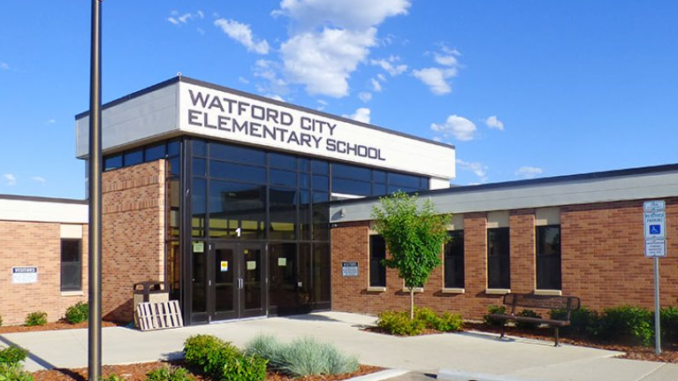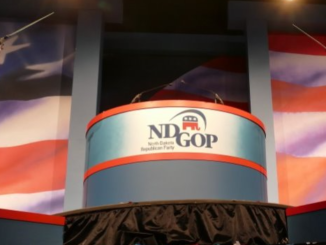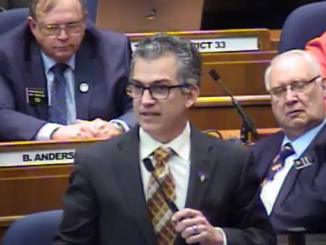
If you’re a property owner, then you’re all too familiar with being plundered because of it. Historically, one of the largest expenditures that results in local government’s jacking up property taxes is schools. As a property owner, you’re also familiar with the largely failed efforts to reduce property taxes in North Dakota. And it only follows that you’re also well aware of the finger pointing that goes on between local political subdivisions and the state when it comes to who is responsible for the ongoing problem.
In short, things are exactly as proponents of eliminating property taxes in 2012 told us they would be if that effort failed— no better, just more of the same.
Just a couple weeks ago, we published an article about House Bill 1525, which proposes to change the way in which the building and maintenance of K-12 schools in the state are funded. With well over $4 billion in the Common Schools Trust Fund — and growing to the tune of $400 million plus annually — the proposal seeks to accomplish the following:
- Use Common School Trust funds to retire outstanding common school bonds.
- Fund all new and/or expanded common school real property facilities from the assets in the Common School Trust.
- Provide for facility maintenance and upkeep for all common school facilities using Common School Trust funds.
As you can imagine, the property tax relief from such a proposal would be significant. And in addition to that, it would also mean a shift towards the state meeting their constitutional obligations to “provide” for “free public schools throughout the state”— a fact explained in a guest article we published from Bob Hale of Minot recently.
Just as we’ve become accustomed to, significant changes such as HB 1525 are frowned upon by those who support the status quo. This has again been proven in the aftermath of yesterday’s House Education Committee hearing on the bill. I received word today that they voted 11-3 for a Do Not Pass recommendation.
A sad aspect of how the bill is being handled comes from the School Lands Board themselves. If you’ve read the two previous articles I mentioned earlier, then you might recall that they’re in charge of managing the Common Schools Trust Fund. But rather than having the research done to attach a dollar figure to the fiscal note on the bill, they took the easy way out— by doing nothing. Instead, their fiscal note isn’t a fiscal note at all. There’s literally no dollar figure on it. Instead it amounts to nothing more than a scare tactic:
“The Department of Trust Lands is unable to determine the amount of debt or value of all of the public school buildings. The Department of Trust Lands is also unable to determine the funds necessary for acquisition, construction, and maintenance of all common school facilities within the State. The Department of Trust Lands is unable to determine all outstanding school bonds and outstanding debt encumbering common schools in the State. The Department of Trust Lands is unable to determine the costs necessary for the maintenance of existing common school facilities, including the land on which the facilities are constructed.
“House Bill 1525 has potential to completely expend the Common Schools Trust Fund. If half of the Common Schools Trust Fund is expended for the purposes of HB 1525, then trust distributions will be half of the 2019-21 biennium distribution rate in perpetuity (at least $183 million reduction per biennium.)”
Unfortunately, it’s certainly an effective tactic. Don’t bother requesting the figures necessary for a fiscal note. Instead, claim you can’t determine the amount, but make speculations like the bill might “completely expend” the entirety of the Common Schools Trust Fund. It’s really quite ridiculous.
I know for a fact that each school district across this state has a business manager. And each district is required to keep track of information like this. Would it really have been that complicated, with the resources the School Lands Board has at their disposal, to get solid numbers for the very things they said they were “unable to determine”?
Was it laziness? Not enough time? Were they afraid the figures may not support their opposition to the bill? Or is it just easier to scare people for lack of information?
Well, I think this can be answered by one simple fact— the information is available through the Department of Public Instruction. That same department that Kirsten Baesler heads as Superintendent. Yes, that same Kirsten Baesler that sits as one of five members of the School Lands Board.
Indeed, it’s true. The very department that Kirsten Baesler is head of could have been of assistance in obtaining the necessary information for the fiscal note from the School Lands Board that she sits on. And not only that, but the document is available on-line. I’m not joking. You can see it here. Debt, valuations, maintenance costs— it’s all there. And it could be had at the click of a button on DPI’s website.
You can look at the numbers yourself, but the figures are exactly what Bob Hale said they were in his recent guest article— about $1.2 billion. Not even close to the “half” speculated in the fiscal note that really wasn’t a fiscal note. And most certainly not the entire amount of the Common Schools Trust Fund.
The School Lands Board should be embarrassed. At the very least, this is pure laziness. At its worst, it’s nearly scandalous. Neither are acceptable.
Oh, and just as a side note. You’ll also notice in the aforementioned 2018 document that if you total up the “Ending Fund Balance” for all the school districts in North Dakota, at the end of the 2016-2017 school year, it was nearly $320 million.
Considering the entirety of it all, is it any wonder that property owners never get the relief we so desperately deserve?
PLEASE LIKE & SHARE!
Note: HB 1525 will now go to the House floor for a vote. We encourage you to contact your representatives and ask that they give this a green vote.
Sources:
- https://theminutemanblog.com/2017/02/13/school-bond-votes-legalized-plunder-of-property-owners/
- https://theminutemanblog.com/2017/04/17/property-taxes-let-the-finger-pointing-begin-again/
- https://theminutemanblog.com/2019/01/17/bill-seeks-to-use-common-schools-trust-fund-for-property-tax-relief/
- https://www.legis.nd.gov/assembly/66-2019/bill-index/bi1525.html
- https://www.nd.gov/treasurer/?id=79
- https://theminutemanblog.com/2019/01/19/guest-article-property-taxes-broken-promises-common-schools-trust-fund/
- https://land.nd.gov/LandBoard
- https://www.legis.nd.gov/assembly/66-2019/fiscal-notes/19-0868-02000-fn.pdf
- https://www.nd.gov/dpi/uploads/171/FinanceFacts2018.pdf





